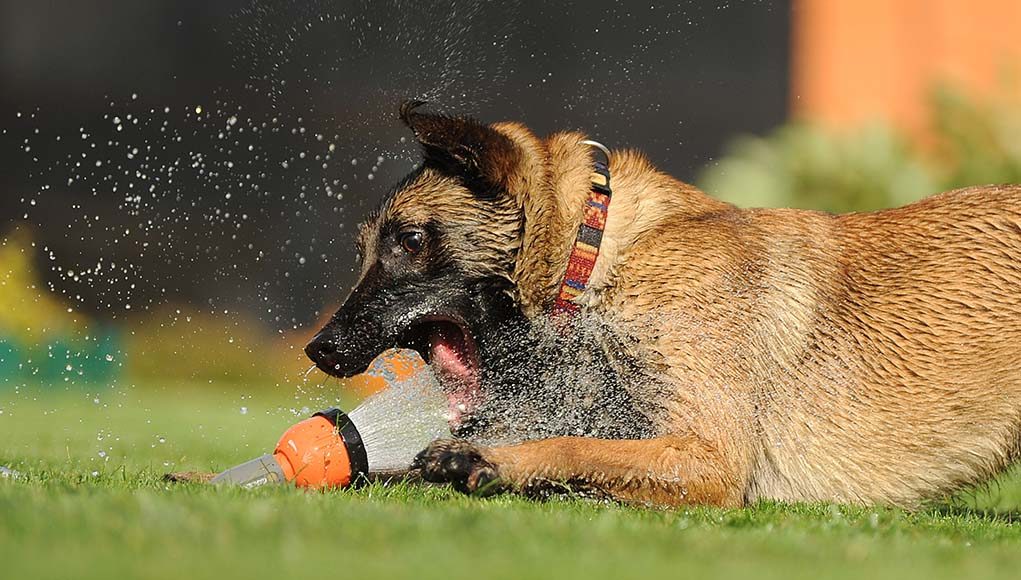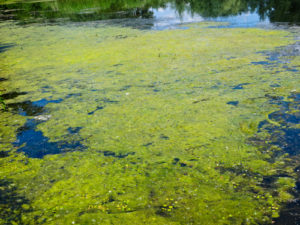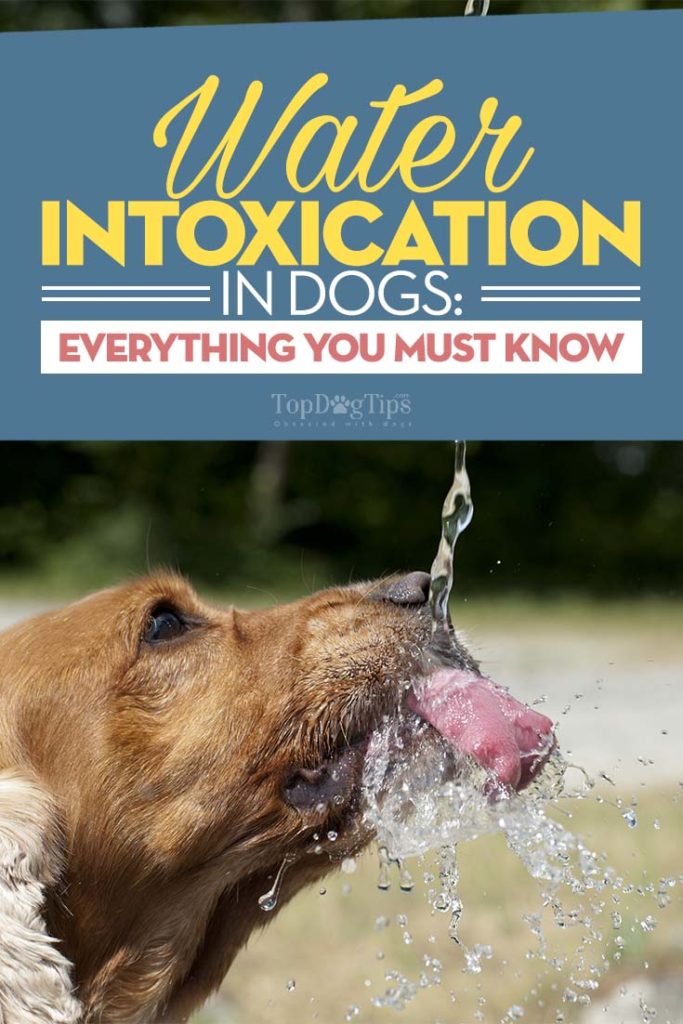Table of Contents
- The Guide to Water Intoxication in Dogs
- What is Water Intoxication in Dogs?
- Who Can Suffer from Water Intoxication?
- Common Symptoms of Water Intoxication
- Fresh Water vs Salt Water Intoxication
- Common Misdiagnosis of Water Intoxication
- Cases of Water Intoxication in Dogs
- Prevention of Water Intoxication in a Dog
- Home Treatment for Dog's Water Intoxication Issue
- Veterinary Treatment
- 4 Other Water-Related Dangers for Dogs
- Water Intoxication in Dogs – In Conclusion
Water intoxication in dogs is what happens when your pet consumes excess water.
This can be from playing in the pool or biting on the garden hose.
The result of excess water is depletion of sodium and chloride levels which are required for the body to function.
Symptoms of water intoxication in dogs vary based on the amount of water consumed, the size and health condition of the dog and the time since drinking.
Some of the most common signs to look for include:
- Vomiting
- Wobbliness when walking
- Lethargy
- Convulsions
This article explains what water intoxication in dogs is and how to prevent it.
But if you’re now worried that your dog may have water intoxication and the dog is not acting quite right, call up your veterinarian.
RELATED: 25 Most Serious Dog Health Symptoms That Cannot Be Ignored
Like this infographic? Spread the word! Share it on your site:
<p><strong>Please include attribution to topdogtips.org with this graphic.</strong></p><p><a href="https://topdogtips.org/water-intoxication-in-dogs/"><img src="https://topdogtips.org/img/Water-Intoxication-in-Dogs.jpg" alt="Water Intoxication in Dogs: Prevention and Treatments" border="0" /></a></p>
The Guide to Water Intoxication in Dogs
Many dogs love playing in and with water, but this can sometimes come with a set of dangers, such as waterborne illnesses, swimming hazards and water intoxication.
Call your vet immediately if you think your dog may be suffering from water intoxication.
Immediate action is necessary because a serious case could lead to a dog's nervous system shutting down within hours, and this can become a life-threatening problem that causes the dog's brain to swell.
Fortunately, with immediate treatment, the prognosis is very promising.
Dog owners should know what to look for when suspecting water intoxication, how to deal with it, and what to do before emergency help can be located.
Educate yourself on water toxicity, and perhaps one day you’ll save the life of your loyal best friend.
What is Water Intoxication in Dogs?
Water intoxication or excessive water consumption in dogs can put your pet in serious and life-threatening danger.
When your dog ingests too much water, it causes a dangerously low sodium level – or to use the technical term, hyponatremia.
Certainly not something to be sniffed at; consuming too much water can be just as dangerous as too little.
Dehydration is more prevalent in dogs; thus, many dog owners aren’t aware of the dangers if the opposite problem were to occur.
Sodium and chloride are essential to keep the body functioning normally, and swelling will occur when these levels deplete due to water intoxication.
Swelling doesn’t just mean a big paw or swollen face, it can also mean swelling in the dog's brain and other vital organs.
Who Can Suffer from Water Intoxication?
There’s no set rule on which dogs will or will not suffer from water intoxication. This can happen to any dog and highly depends on a situation. But some factors will make certain dogs more susceptible to water intoxication than others.
Small dogs and puppies
Water intoxication in dogs is a form of poisoning.
Just as children are far more likely to have extreme reactions than adults, the same goes young and small canines.
The reason is, of course, the smaller the dog, the lower the capacity for water.
Dogs that love to play with or in water
Most dogs love playing in the water. While it’s a joy to watch them having such a great time swimming in the lake or biting at the stream of water from the hose pipe, you’ve got to be wary of accidental poisoning.
Lean breeds
Perhaps a surprising one here, the leaner the dog, the lower their resilience for water intoxication.
Experts have noted that this is due to a faster metabolism, resulting in the excess water absorbing into the body even more quickly.
Common Symptoms of Water Intoxication
The quicker that you can identify the signs of water intoxication in a dog, the better.
If caught in the very beginning, your pet will have a far better chance of survival.
Some of the first symptoms to occur are:
- anxiety
- vomiting
- excessive drooling
- wobbliness when moving
- muscle twitches
As the hyponatremia progresses, the symptoms become much more severe.
If you see any of these symptoms occur, consult your veterinarian immediately:
- mouth hanging open
- staggering when trying to walk
- inability to control bladder
- severe muscle spasms
- fits and convulsions
- falling in and out of consciousness
Fresh Water vs Salt Water Intoxication
Another danger for dogs that spend time enjoying the sea or ocean is salt poisoning, also known as hyPERnatremia.
While similar in name to hyPOnatremia (water intoxication), the symptoms of hypernatremia in dogs may be different.
When your dog has salt poisoning, he may develop the following symptoms:
- dehydration
- vomiting
- uncontrolled bowel movements
- fits and convulsions
If you worry that your dog may be suffering from hypernatremia, consult your veterinarian immediately.
Salt poisoning can detrimentally affect neurological function, and even cause death.
Common Misdiagnosis of Water Intoxication
Unfortunately, because this condition isn't very common, there's not enough scientific research behind water intoxication in dogs to give veterinarians better tools in diagnosis, prevention and treatment.
This is why misdiagnosis is a common occurrence.
Be wary of diagnosis by your vet of the following conditions, as their symptoms are very similar to signs of water intoxication:
- head trauma
- overexertion
- hypothermia
- salt poisoning
As the owner, it’s up to you to give your veterinarian the full picture and describe how the dog behaved before, during and after you've noticed any signs of the problem.
Cases of Water Intoxication in Dogs
There have been some tragic tales of owners losing beloved pets due to water intoxication.
One such story from Whole Dog Journal was the tale of Kinetic, a three-and-a-half-year-old Papillon owned by a lady named Susan.
An excellent example of what an owner should be, the story runs through Susan's standard routine of limiting the time that Kinetic was allowed play in the pool to ensure that she didn’t overexert herself.
One hot day, only thirty minutes after giving Kinetic a scheduled rest break from pool play, Susan found her beloved pooch unresponsive on the couch.
Unfortunately, pushing her to the vet for immediate help wasn’t enough to save Kinetic.
There are other stories to read out there as well.
Most end with dog owners recognizing the symptoms and having excellent veterinary care.
It results in saving the dog’s life, and no long term effects!
We hope that through articles like this and owners like Susan sharing their stories, we can increase the awareness of hypernatremia.
It's our responsibility to share knowledge about how to recognize the symptoms and provide treatment.
Prevention of Water Intoxication in a Dog
As the adage goes, prevention is better than a cure.
I hope that all responsible dog owners will read, and share these top tips for preventing water intoxication in dogs:
1. Limit play time in the water, especially if you’re playing fetch.
If you usually throw a ball for your dog to retrieve from the water, consider replacing this with a flat toy.
This will decrease the chance of him accidentally swallowing water while grabbing the ball.
2. Always supervise your dog when he's playing with water.
Some dogs that bite at the stream from sprinklers just don’t know when to stop.
3. If your dog is prone to over drinking, it’s advisable not to leave him with access to unlimited amounts of water during the day.
A bucket of water isn’t necessary. A bowl will do just fine.
4. Keep on top of your dog's health with regular checkups at the vet.
Some kidney issues can affect the body’s ability to eliminate fluids.
5. Always have water available.
This may be counter-intuitive, but the time that your dog is most likely to over-consume water is when he’s incredibly thirsty.
You reduce this risk by having a small bowl of water available at all times.
Home Treatment for Dog's Water Intoxication Issue
There is no home remedy treatments per se, and the dog will need to see a vet.
Suppose you ever notice that your dog is suffering from any of the symptoms mentioned above.
In that case, you should only restrict access to any additional water and then immediately consult your veterinarian.
Water intoxication in dogs can quickly turn very bad, with a dog going from a big bundle of energy to unresponsive within 1-2 hours.
Veterinary Treatment
Reacting quickly is of utmost importance.
While your dog may no longer be drinking water, his body will still absorb water he has already ingested.
Dogs can suffer from brain damage disturbingly quickly.
While treatments can reverse the effects of water intoxication reasonably quickly, the damage that remains is harder to overcome.
If you have to bring your pet to a veterinarian's office for water intoxication, you can expect one or a mixture of the following three treatments:
- Administering an IV to replenish electrolytes
- Diuretics to encourage urination
- Mannitol is sometimes given to decrease cranial pressure
While dogs may recover on their own from minor water intoxication, the risk of death from this ailment makes it unwise to wait it out at home.
RELATED: 15 Cheap Ways to Prevent Most Common Health Issues in Dogs
4 Other Water-Related Dangers for Dogs
Excessive water consumption and salt poisoning aren’t the only hazards your dog could face around the water this summer.
Keep your eyes peeled for the below dangers.
1. Algae Poisoning
You've seen ponds covered in stinky green and blue algae.
While it’s an obvious, immediate turn-off for humans who were considering going in for a dip, our joy filled dogs are less likely to be perturbed.
Algae looks gross, but it's also toxic to dogs.
Furthermore, for dogs and humans alike, getting algae on the skin can cause a nasty rash and should be thoroughly washed off as soon as you’re out of the water.
An additional danger for dogs is when they drink the algae-infested water.
More than just giving them an upset stomach, it can detrimentally affect their liver, intestines, kidneys, and central nervous system.
If your dog begins to exhibit symptoms such as vomiting, diarrhea and difficulty walking, consult your veterinarian immediately.
2. Parasites
In any stagnant water, it’s highly likely for there to be a bacteria build up.
Most dogs with a healthy immune system will be able to shake off an infection or parasite infestation with some rest and over-the-counter treatments.
Older dogs, dogs with a history of medical issues and puppies, however, are more likely to have a more severe reaction and require veterinary attention.
3. Jellyfish
For dogs, jellyfish dangers is more than just painful sting; it can even be deadly.
As a human walking through the water or along the beach, the chances are that if you’re stung it will be on your foot or lower leg.
As dogs explore the world with their mouths and noses, it’s highly likely that they will be stung on their nose, face or tongue.
In any of these areas, it will result in swelling and difficulty breathing.
The first action plan if your dog is stung by a jellyfish must be to go to the veterinarian immediately. Not a cheap affliction, you could be looking at costs anywhere from $800-$3000 in vet bills.
They have to remove any stingers that are still attached quickly. Interestingly, the stingers on a jellyfish can continue to react for several weeks.
4. Drowning
On a hot summer's day, nothing beats that refreshing feeling of jumping in the lake or swimming pool to cool down, so it goes for your canine pal.
But, all too often the risk of drowning is discounted.
After all, dogs are such great swimmers that we have a stroke named after them – the doggy paddle.
Beware the danger of an exhausted dog, and a steep incline. Whether your pup is in a swimming pool or an open body of water, an exhausted dog can struggle to get out of the water without a little help.
For that reason, it's always recommended to use a dog life vest.
Water Intoxication in Dogs – In Conclusion
Water intoxication, while uncommon, is a dangerous condition.
As a responsible dog owner, it’s up to you to be aware of these potential hidden dangers lurking in plain sight.
Do your dog a favor and pay attention to his behavior. By knowing how he acts when at his healthiest, you’ll be able to spot any medical problems much faster.
Therefore, you'll be able to treat and overcome potentially devastating medical issues if they arise.
There are ways to avoid water-related dangers.
From throwing flat toys into the water rather than round ones to outfitting your dog with his very own life jacket, it's your responsibility to keep your Fido safe when he's near the water.
READ NEXT: Water in Dog's Ears – What to Do About It

















